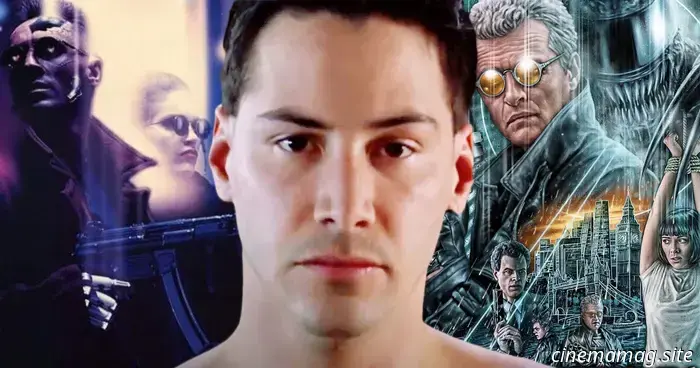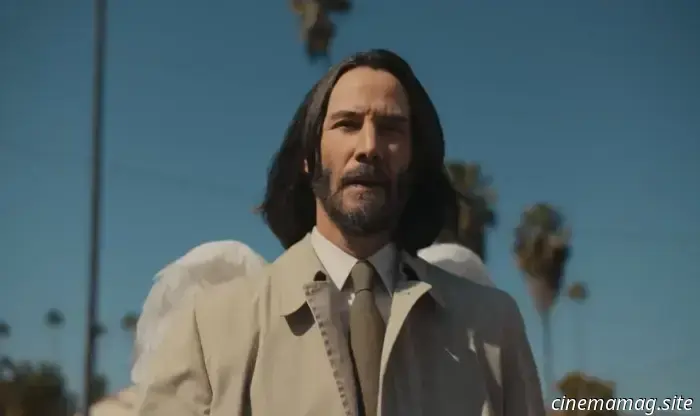
8 Must-See Cyberpunk Films
Casey Chong presents eight excellent cyberpunk films that should be on your watchlist…
Cyberpunk cinema first gained prominence in the early 1980s with Ridley Scott’s iconic film Blade Runner, a landmark not only for its visual aesthetics but also for its grim portrayal of urban dystopia and artificial intelligence. Following this, well-known cyberpunk films such as Akira, Ghost in the Shell, and The Matrix adeptly encapsulated the essence of the subgenre, merging thought-provoking themes with widely appealing entertainment. However, many cyberpunk films were overlooked or faded into obscurity post-release. Here are eight cyberpunk films that are definitely worth watching if you haven't seen them yet…
**Hardware (1990)**
Richard Stanley's directorial debut, Hardware, combines edgy sci-fi horror with a grim, cyberpunk-style dystopia, unflinchingly showcasing graphic violence. The movie features a formidable killer robot named M.A.R.K. 13, reminiscent of a mix between The Terminator and RoboCop 2, yet it stands out with its genuinely unsettling presence. Stanley's effective use of special effects, particularly impressive for a film made on a modest budget of $1.5 million, further enhances its appeal. He also exhibits a flair for both gritty and stylish visuals, infused with a Mad Max-like aesthetic. Additionally, the film is celebrated for its outstanding soundtrack featuring songs like Iggy Pop's 'Cold Metal' (with Pop himself in a cameo as Angry Bob), Motörhead's 'Ace of Spades,' and Ministry's 'Stigmata.'
**Nemesis (1992)**
Albert Pyun is known for being a hit-or-miss director, yet he produced notable B-movies such as Cyborg and Nemesis, the latter being his most significant work. Although it draws heavily from Blade Runner and The Terminator, Nemesis remains engaging for a B-grade film. Pyun cleverly utilized various locations, including the Kaiser Steel Mill in Fontana, California, and Old Tucson in Arizona to establish the film's post-apocalyptic setting. The action sequences are thrilling, and Olivier Gruner delivers a stoic performance as Alex Rain, a half-human, half-cyborg LAPD officer. The movie spawned four lesser sequels, none of which can compare to the original from 1992.
**Split Second (1992)**
Rutger Hauer, familiar with the cyberpunk genre as Roy Batty in Blade Runner, assumes the role of an antihero in this film—a disgruntled cop in a flood-prone dystopian London, determined to find a serial killer to avenge his partner's death. The cyberpunk aesthetics lean towards a B-movie style with neo-noir influences, mixing genres with monster-movie themes and psychological thrills in an entertaining package, largely due to Hauer's committed portrayal. The film features a buddy-cop dynamic, pairing Hauer’s grizzled veteran with Neil Duncan’s mild-mannered, Oxford-educated partner. Despite its modest budget of $7 million, the action sequences are surprisingly well-executed. Split Second barely managed to break even at the box office but has since gained a cult following.
**Johnny Mnemonic (1995)**
Before Keanu Reeves reinvigorated his career with The Matrix, he explored the cyberpunk realm in Johnny Mnemonic. This film, directed by music video director Robert Longo, is based on William Gibson's 1981 short story and serves as a quintessential 90s cyberpunk snapshot—featuring themes of information overload, data breaches, virtual reality, and corporate conspiracies involving the Yakuza, represented by Takeshi Kitano and Denis Akiyama. Keanu plays an antihero and data courier carrying sensitive information, making it a chase film centered on evading the Yakuza while fulfilling his mission. Although the special effects may seem dated and some plot points are shaky, Johnny Mnemonic retains an intriguing concept and a distinctly B-movie feel.
**Strange Days (1995)**
Despite being co-written and co-produced by James Cameron, Strange Days underperformed at the box office, earning only $17 million against its $42 million budget. However, Kathryn Bigelow's dystopian sci-fi thriller deserves more recognition as it subtly intertwines the sociopolitical turmoil of the 1992 Los Angeles riots, issues of police brutality, and the perils of shared memory through a controversial device called SQUID, which records memories directly from the user's brain. Ralph Fiennes, who plays a dubious black-market dealer selling SQUID recordings, delivers a surprisingly fitting performance alongside Angela Bassett as his loyal bodyguard. The film also weaves in a murder mystery, showcasing Bigelow’s talent for crafting stylish and dynamic action sequences, including a riveting nighttime car chase.
**eXistenZ (1999)**
David Cronenberg revisits themes similar to those in Videodrome with eXistenZ









Other articles
 In the trailer for Aziz Ansari's Good Fortune, Keanu Reeves portrays a bungling angel.
Lionsgate has released a delightful first trailer for Aziz Ansari's Good Fortune, marking his debut as a director. In this film, Keanu Reeves portrays a clumsy angel who interferes in the lives of humans on Earth. With a script by and featuring Ansari (Master of None), Good Fortune also includes performances from Seth Rogen (The Studio), Keke Palmer (Nope), […]
In the trailer for Aziz Ansari's Good Fortune, Keanu Reeves portrays a bungling angel.
Lionsgate has released a delightful first trailer for Aziz Ansari's Good Fortune, marking his debut as a director. In this film, Keanu Reeves portrays a clumsy angel who interferes in the lives of humans on Earth. With a script by and featuring Ansari (Master of None), Good Fortune also includes performances from Seth Rogen (The Studio), Keke Palmer (Nope), […]
-Movie-Review.jpg) Karate Kid: Legends (2025) - Film Review
Karate Kid: Legends, 2025. Directed by Jonathan Entwistle. Featuring Ben Wang, Jackie Chan, Ralph Macchio, Joshua Jackson, Sadie Stanley, Ming-Na Wen, Aramis Knight, Wyatt Oleff, Shaunette Renée Wilson, David Robitaille, Tim Rozon, William Zabka, and Pat Morita. SYNOPSIS: Following the move of kung fu prodigy Li Fong to New York City, he draws unwanted attention from a […]
Karate Kid: Legends (2025) - Film Review
Karate Kid: Legends, 2025. Directed by Jonathan Entwistle. Featuring Ben Wang, Jackie Chan, Ralph Macchio, Joshua Jackson, Sadie Stanley, Ming-Na Wen, Aramis Knight, Wyatt Oleff, Shaunette Renée Wilson, David Robitaille, Tim Rozon, William Zabka, and Pat Morita. SYNOPSIS: Following the move of kung fu prodigy Li Fong to New York City, he draws unwanted attention from a […]
-Movie-Review.jpg)
 NO LIFE: Zombie Survivor reveals an intense gameplay trailer.
Developer VaragtP has unveiled a new teaser trailer for NO LIFE: Zombie Survivor, highlighting its intense gameplay. This forthcoming survival roguelite, set to launch on Steam, will have players battling against waves of zombies alongside their loyal canine companion. Check out the new trailer below…. In NO LIFE: Zombie Survivor, players will struggle for survival in procedurally generated […]
NO LIFE: Zombie Survivor reveals an intense gameplay trailer.
Developer VaragtP has unveiled a new teaser trailer for NO LIFE: Zombie Survivor, highlighting its intense gameplay. This forthcoming survival roguelite, set to launch on Steam, will have players battling against waves of zombies alongside their loyal canine companion. Check out the new trailer below…. In NO LIFE: Zombie Survivor, players will struggle for survival in procedurally generated […]
 Well Go USA releases a trailer for the Korean drama Big Deal.
Well Go USA has released a poster and trailer for the 1990s Korean drama Big Deal, written and directed by Yun-Jin Choi. The film revolves around an attempted hostile takeover of Korea’s leading Soju company amid the Asian financial crisis. The cast includes Yoo Hai-jin, Lee Je-hoon, Son Hyun-joo, Choi Young-jun, and Byron Mann. Check out the trailer below… […]
Well Go USA releases a trailer for the Korean drama Big Deal.
Well Go USA has released a poster and trailer for the 1990s Korean drama Big Deal, written and directed by Yun-Jin Choi. The film revolves around an attempted hostile takeover of Korea’s leading Soju company amid the Asian financial crisis. The cast includes Yoo Hai-jin, Lee Je-hoon, Son Hyun-joo, Choi Young-jun, and Byron Mann. Check out the trailer below… […]
 12 Remarkable Young Actors Who Achieved Success Without Family Ties
Here are 12 young actors who achieved success on their own merit — through hard work and an abundance of talent. No nepotism involved.
12 Remarkable Young Actors Who Achieved Success Without Family Ties
Here are 12 young actors who achieved success on their own merit — through hard work and an abundance of talent. No nepotism involved.
8 Must-See Cyberpunk Films
Casey Chong presents eight outstanding cyberpunk films that deserve a spot on your watchlist. The genre began to gain prominence in the early 80s with Ridley Scott’s iconic film Blade Runner, which set a benchmark not only for its striking visual aesthetics but also for its grim portrayal of urban dystopia and artificial intelligence. Following this, other well-known cyberpunk films such as Akira...
